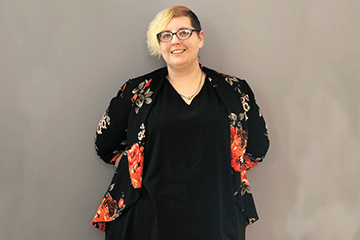
10/28/2019
Fresh out of high school in 2005 and enrolled at Tompkins Cortland Community College, Ashley Dickson was described by friends as the life of the party.
Dickson, born and raised in Dryden, N.Y., where the college is located, lasted half a semester.
“I got sober in early 2015,” recalled Dickson, who self-identifies as queer and prefers the pronouns they, them and their.
Today, Dickson is working to prevent students from taking the path to addiction. As TC3’s recovery support specialist for its Collegiate Recovery Program (CRP), they communicate closely with students in the club Alliance for Recovery at Tompkins Cortland, prepare applications for program funding, work to bolster program sustainability, plans events and coordinate support meetings.
“I strongly believe that prevention and recovery are one and the same, they’re two sides of the same coin,” said Dickson, a senior human services major at SUNY Cortland who graduates in May. “And people in recovery are in a strong position to help with prevention.
“I was not stable,” Dickson reflects on the earlier attempt at higher education. “I was 18 and life was a lot. I was just not mentally well and I still struggle with mental illness. To some degree, we all do.
“The long and short of it is I struggled with substance use for the next 10 years,” Dickson said.
A year into recovery, Dickson enrolled in TC3. Old friends now found them boring, but they persisted with mental counseling, substance use self-help groups and the affection of their tiger striped, white-bibbed emotional support cat, Melon.
Recently, Dickson has applied to graduate school in community health.
“I’m not planning on going for my Ph.D., but there’s definitely room for research and presenting on topics within the degrees I’ll have,” they said.
In January, Dickson will speak on “Intersectional recovery: gender identity and sexuality inclusivity in collegiate recovery spaces” at the National Association of Student Affairs Administrators in Higher Education’s conference in New Orleans.
“Statistically people in the LBGTQ community are at higher risk for substance use disorders and that’s something that I want to change,” they said of their upcoming presentation.
Dickson also had a chance to say a few words last spring, when SUNY Chancellor Kristina Johnson attended and spoke at TC3’s ceremony to open its new recovery space on campus, complete with a lounge space, comfy couches, a beautiful carpet, a place for books on recovery in mental health and addiction that visitors can read, leave or take.
“One of my brags is that it was the first dedicated collegiate recovery space at a community college in New York,” Dickson said. “(Johnson) said this is something she wants to see on every campus. Part of me deep down said, ‘challenge accepted.’”
SUNY Cortland has some 300 non-traditional students enrolled.
The College defines its non-traditional undergraduate students as those who are at least 24 years old or have had an interruption or delay in their education since high school. They also might have dependent children, regardless of their ages.
The College celebrated them all Oct. 28 to Nov. 1 with Non-Traditional Students Week. In addition to an array of activities offered through Advisement and Transition, one inspiring non-traditional student was introduced daily to the SUNY Cortland community.
For more information about Non-Traditional Students Week events or to recognize an outstanding non-traditional student, contact Non-Traditional Student Support Coordinator Cheryl Hines at 607-753-4726.